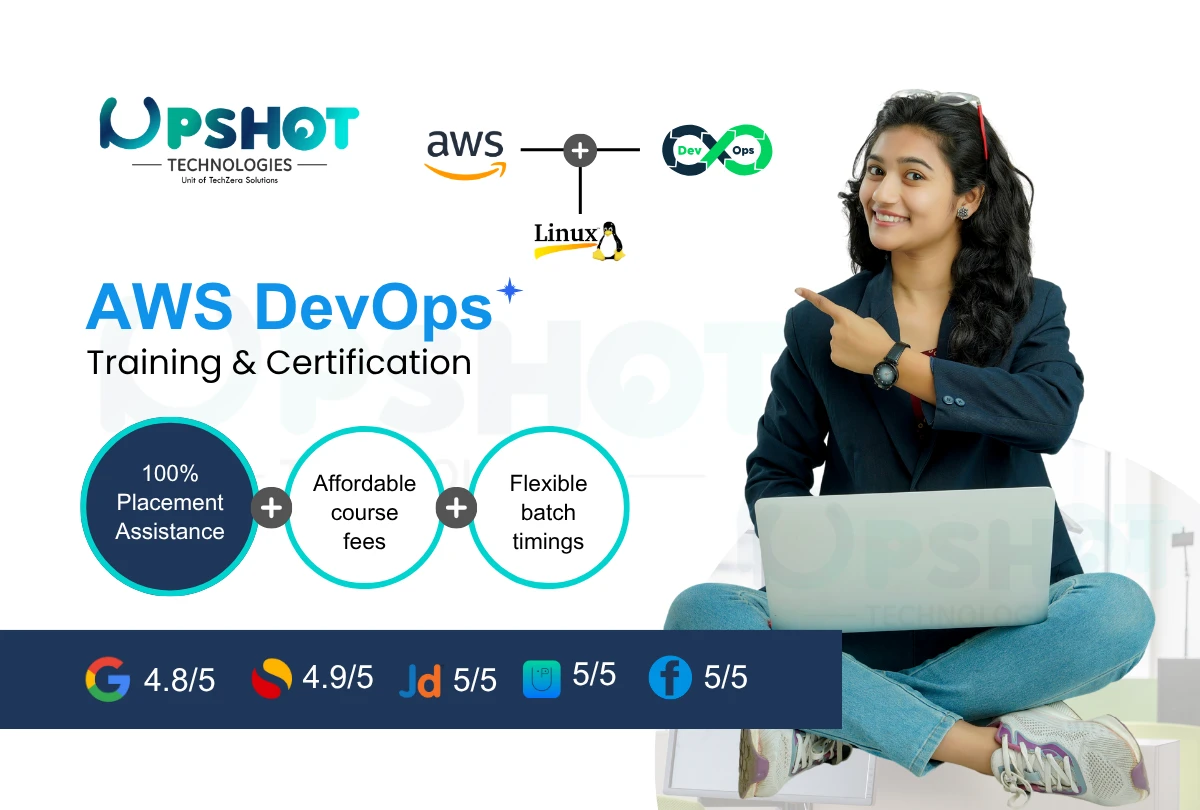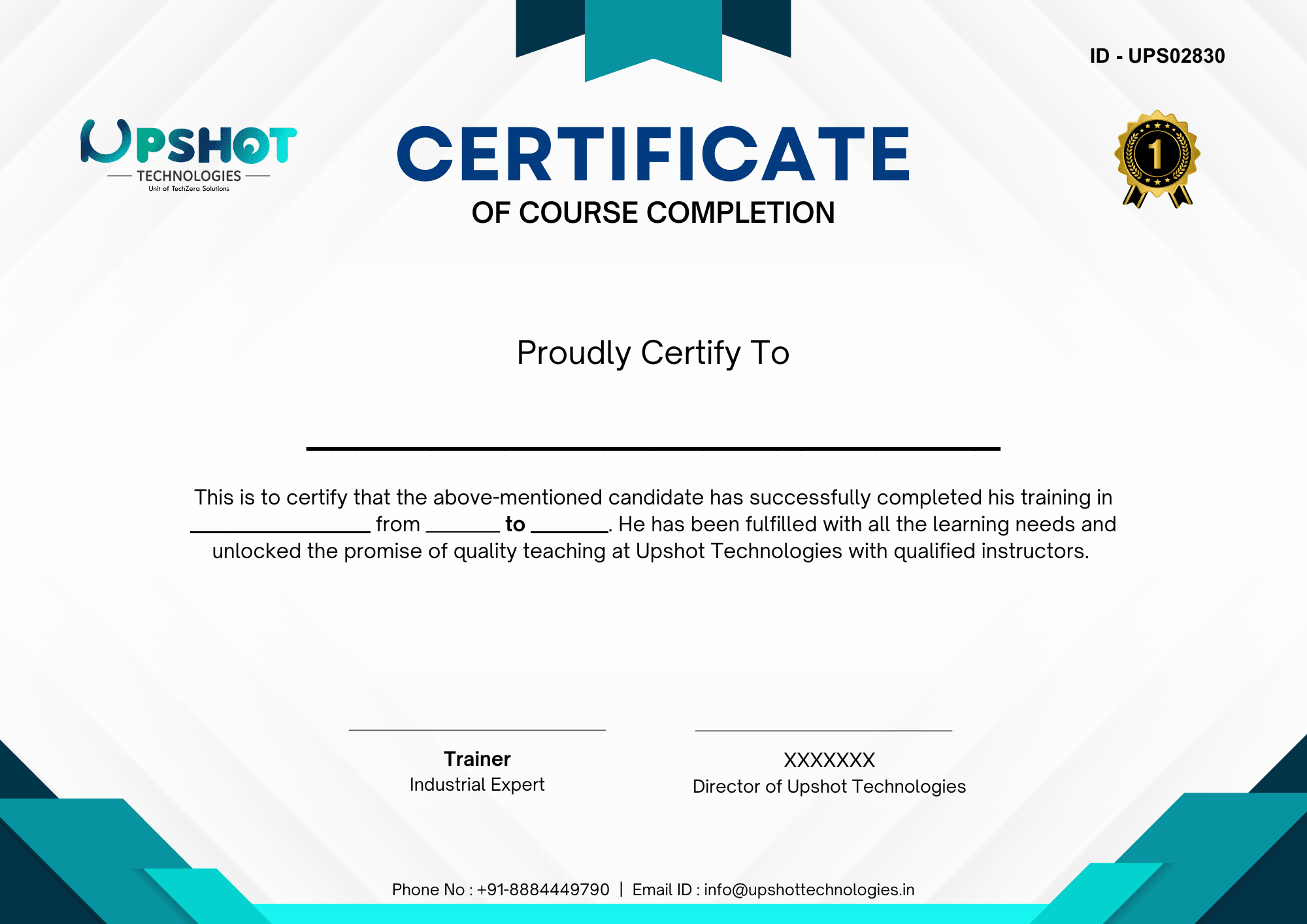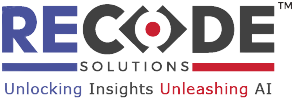AWS Devops Course in Bangalore
Rating 4.9/5 by 1000+ Students
AWS DevOps Course in Bangalore will help you build your skills with 20+ tools in Amazon web services like EC2, VPC, AWS cloud trail, AWS config, cloudwatch, RDS, EFS, etc. You will also learn Devops tools covering Chef, Jenkins, Ansible, Git, Maven, Docker, CI/CD pipeline, Kubernetes, etc. This AWS DevOps training in Bangalore will perfect your skills in 5+ hands-on projects with seamless access to AWS Cloud and DevOps labs. In this AWS and DevOps course in bangalore, you will learn the latest tools and technologies in cloud computing and DevOps on the cloud from industry experts with extensive experience. Join this course today, enrol for a free demo class.
7+
Years in training
5,000+
Professionals Trained
98%
Placement Rate

Why Enroll in Our AWS DevOps Training in Bangalore?
Upshot Technologies is a trusted AWS DevOps Training institute in Bangalore, Rajajinagar offering one of the best AWS and DevOps Training in Bangalore with placement. With 10+ years of experience and 5,000+ students placed.
Alumni Achievements & Placements
Upshot Institute has trained over 5,000+ students through affordable, flexible training. Our hands-on courses and personalized guidance give you the skills and connections to land your dream job.
Trusted By Learners For Approach, Quality & Support
Avg rating from 3000+ reviews (4.9/5)
AWS Devops Training in Bangalore Overview
This aws and devops training in bangalore course offers high quality training in the AWS DevOps methodology and its associated tools and technologies that are transforming the AWS and DevOps industry. From AWS services/ tools like Aws Lambda, EC2, Virtual machines, S3, load balancing, and more to DevOps tools like Terraform, Kubernetes, Ansible, Jenkins, Docker, Git, GitHub - we've got you covered. Among the many AWS modules and ideas that Upshot covers are autoscaling, cross-zonal bandwidth allocation, cloud services, constructing a private virtual cloud (VPC), deploying EC2 instances, and using the AWS Management Console.
While following DevOps concepts, students will find out how to utilize Amazon Web Services to implement CI/CD, monitoring, infrastructure as code, continuous deployment, and more. Participating in this course will provide you with the knowledge and skills necessary to optimize your software creation and deployment pipeline, as well as to foster better communication and cooperation between your operations and development groups.
Eligibility for AWS and DevOps Course in Bangalore – Upshot
AWS DevOps Course in Bangalore - Upcoming Batches
With both online and classroom learning formats, this best AWS DevOps Courses in Bangalore allows you to learn at your own way. Weekends as well as weekdays sessions and flexible learning options are available that fit your schedule.
Curriculums for DevOps & AWS Training in Bangalore
Best institute for aws and devops in Bangalore, our curriculum provides Intensive hands-on projects in AWS and DevOps through Immersive case study learning and Innovative learning solutions. This curriculum is your fast-track to a rewarding, in-demand career. Rather than outdated textbooks, you'll develop the exact skills employers want through practical application and insights from industry experts.
Section 1 : Linux Fundamentals
- Vim editor modes
- File system hierarchy – Basic topics
- File and directories creation
- Grep
- Filter commands (head,tail,more,less)
- Creating users and groups
- Important files related
- Modifying, deleting users and group
- Linux permissions
- Basic permissions overview
- Software management
- Yellow dog update modifier(yum)
- Yum commands
- Different run levels
- Services and daemons
Section 2 : Why Cloud?
- Why Cloud and what is Cloud Computing?
- Identify the features and benefits of cloud computing
- Different types of Cloud Computing deployment model
- Public Cloud, Private Cloud, Hybrid Cloud
- Virtualization – An essential in cloud
- Virtualization in Cloud model
- Different types of virtualization
- Hypervisor – Benefits
- Different types of services and its difference in Cloud computing
- IaaS, PaaS, SaaS
- Importance of scaling in cloud computing
- Different types of scaling and its applications
- Issues we overcome using cloud and applications
- Cost model that we use in cloud computing
Section 3 : AWS – An overview
- Describe the features of AWS
- The features of AWS marketplace
- Describe the features of Amazon Compute Services
- Describe the features of Amazon Storage Services
- Describe the features of Amazon Network Services
- Describe the features of Amazon Database services
- Describe about various services in AWS
- Global Infrastructure – Regions and Availability Zones
- Create a free tier account in AWS and on boarding
- Introduction AWS management console
Section 4 : Understand IAM of AWS
- Protect your AWS by different authentication system
- Password policies set for users
- AWS User Account and Groups in detail
- Creating custom policies in AWS
- Introduction about Roles and its use
- Creating Roles and associating policies
- Creating programmatic access and management console access for users
- Associating policies to the user and groups
Section 5 : EC2 Instance
- Describe AMI and AWS Marketplace templates
- Launch a basic EC2 instance
- Different types of Instances Reserved, On-demand, Spot, Dedicated
- Security groups and tags for EC2 instance
- Public key – Private key introduction and protecting EC2 with keys
- Attaching and detaching EBS volumes
- Launch an ec2 instance from an AMI
- Create custom AMI and working with different region
- Make use of Amazon EBS volume and create snapshots
- Manage the configuration of your application
- Deploying a new instance from the created AMI
Section 6 : Auto-scaling
- Get Started with Auto Scaling Using the Console
- Creating Launch configurations and make use of it for autoscaling groups
- Maintain a Fixed Number of Running EC2 Instances
- Dynamic Scaling
- The lifecycle of auto scaling
- Policies of auto scaling
Section 7 : Load Balancing
- Introduction to Load balancer (ELB)
- Different types of Load balancer in AWS
- Application Load balancer
- Network Load balancer
- Classic Load balancer
- Migrating classic load balancer to new load balancer
- Components and types of load balancing
Section 8 : EBS (Elastic Block Storage)
- Create EBS volumes
- Delete EBS Volumes
- Attach and detach EBS volumes with EC2 instance
- Creating and deleting snapshots
Section 9 : S3 Object Storage in Cloud
- Understanding S3 durability and redundancy
- Introduction about S3 Buckets
- How S3 Uploading works and how to Download
- How to manage S3 Permissions
- How to implement S3 Object Versioning
- S3 Lifecycle Policies
- Storage Gateway
- Import Export
- S3 Transfer Acceleration
- Glacier storage
Section 10 : Cloud Front
- Describing CloudFront
- Creating a CloudFront distribution
- Hosting a website with CloudFront distribution
- Implementing global restrictions
- Configuring origins and behaviors
Section 11 : Route 53
- Describe Hosted zones and Domain name understanding
- How to create hosted zones
- Hosting a website with custom domain name
- Understanding routing policies
Section 12 : AWS Security Management
- Describing Security Practices for Cloud Deployment
- AWS Shared Responsibility Model and Securities
- Importance of CloudTrail
- Describing Trusted Advisor
Section 12 : AWS Security Management
- Describing Security Practices for Cloud Deployment
- AWS Shared Responsibility Model and Securities
- Importance of CloudTrail
- Describing Trusted Advisor
Section 13 : Amazon Virtual Private Cloud (VPC)
- Introduction to Amazon Virtual Private Cloud (VPC)
- VPC Advantages and understanding IP addressing CIDR
- Default and Non-default VPC
- Different Components in VPC
- Describe, create, and manage Amazon Virtual Private Cloud
- Amazon VPC, Private Subnet, and Public Subnet
- AWS Networking, Security Groups, and Network ACLs
- Configuration and management of VPN connectivity
- Subnet and Subnet Mask
Section 14 : Relational Database Service (RDS)
- Introduction to RDS
- Different database services of AWS: Amazon RDS, DynamoDB, Redshift etc.
- Create MySQL RDS Instance
- Create Oracle RDS Instance
- Create MS SQL RDS Instance
- Configuring the database
- Configuring backups
- Configuring the maintenance windows
- Connecting to the database
Section 15 : Monitoring Services
- Knowledge on CloudWatch – A monitoring service
- Create and Configuring Monitoring services
- How to perform Setting thresholds and Configuring actions
- Creating a CloudWatch alarm
- Getting statistics for EC2 instances
- Monitoring other AWS services
- Configuring Notifications
- Integrating CloudWatch with Auto Scaling
Section 16 : Application Services – An Overview
- What is SNS
- Creating a topic
- Create subscription
- Subscribed to the subscription
- SQS & SES
- Lambda and Elastic Beanstalk
Module 1 : DevOps History & evolution of DevOps
- DevOps Market Overview:
- What is the market trend of DevOps
- Which background people can switch to DevOps
- Some typical tool stack for DevOps Jobs
- How to get maximum from the course
- Version Control Systems:
- Client-Server and Distributed Version control system
- Git
- Advantages of Git over SVN
- Git User trends
- Different Git tools (Git Desktop, Kraken)
- Git Installation and Configuration
- Setting up Git Bash and Git UI
- Creating first repository: Local
- Git commands:
- add
- commit
- push
- status
- history
- Branching:
- Branch why what? Understanding Master
- Creating a Branch
- Merging a Branch
- Resolving Merge conflicts
- Checking the difference
- Tags:
- Understanding the tags: Modifying
- Undoing changes
- Deleting and discarding
- Linux Administration:
- A Linux Introduction
- Open Source Philosophy
- Distributions
- Embedded Systems
- Command Line Basics:
- Basic Shell
- Command Line Syntax – ls
- Command Line Syntax – $PATH, Case Sensitivity
- Command Line Syntax – Basic Commands
- Command Line Syntax – uname
- Command Line Syntax – Command History, Command Completion
- Command Line Syntax – cd and pwd
- Shell Configuration Files
- Variables:
- Environment / System Variables
- User Defined Variables
- Advanced Command Line:
- Globbing
- Quoting
- Formatting Commands
- Working with Options
- Getting Help:
- Man pages
- Info
- locate, find, whereis
- Using /usr/share/doc/
- File System Operations:
- The Linux File System
- Files, Directories
- Hidden Files and Directories
- Home directory
- Absolute and Relative Paths
- Creating, Moving and Deleting Files
- Archiving Files on the Command Line
- Text Processing:
- Searching and Extracting Data from Files
- Command Line Pipes
- I/O Redirection
- Regular Expressions
- Scripting Basics:
- Turning Commands into a Script
- Basic Text Editing
- Basic Shell Scripting
- Operating System Concepts:
- The Linux Operating System
- Choosing an Operating System
- Windows, Mac, and Linux Differences
- Application Deployment:
- Create a Tomcat Server and Deploy the application manually
- Create a Tomcat Server and Deploy the Application Using Maven
Module 2 : Jenkins
- Why Jenkins?
- What is Continuous Integration and Continuous Deployment (Use Case1)
- Jenkins installation and Configuration
- Running Jenkins as windows service
- Deploying Jenkins in Tomcat Server
- Jenkins Global Configuration
- Building your first Hello world job
- Jenkins User Management
- Jenkins Plugin management
- Jenkins SCM configuration (Git SVN)
- What is Virtual Machine
- Why we need it
- What is Container
- Difference between Containers and Virtual Machine
Module 3 : Docker
- Docker Installation and Configuration
- Major Docker Components
- Container Management Running Containers
- Docker file
- Working with Registries
- Docker Port Forwarding
- What is Configuration Management
- Configuration Management Challenges
- Configuration Management in DevOps Ecosystem
- Some tools
- Trends
- What is Container and Containerization
- Different types of Containers
- DOCKER: What why how ?
- Use Case 1 (Why Docker)
- Docker installation
- Docker VS Vagrant
- Docker Run commands
- Advanced Docker run commands
- Docker volume persistence
- Overview of Docker Compose
- Docker Hub
- Creating your own image
- Advanced reference
- Create a Docker container to run Jenkins
- Create a Docker container to run a CI/CD pipeline
Module 4 : Ansible
- What is Ansible
- Advantages of Ansible
- Environment Provisioning
- Configuration Deployment
- Installation of Ansible (AWS)
- Modules
- Playbooks and Writing a Playbook
- What is Monitoring
- Why we need monitoring
- Different tools of monitoring
- What is Nagios
- Nagios Architecture
- Different components of Nagios
- A typical Nagios Dashboard
- Installation and Configuration
Module 5 : Terraform
- Terraform Basics:
- Introduction Terraform Construction
- Terraform Construction (on Windows) Vagrant is used to install Terraform
- Terraform Fundamentals:
- Terraform's First Steps – AWS Setup
- Terraform's first steps – spinning up an instance
- Terraform's first steps – a summary
- Terraform Configuration:
- Variables in Terraform Basics
- Variables in action
- Characteristics that are output
- Attributes Output Demo
- Remote state Data Sources Demo
- Templates
- Terraform Modules:
- Modules for Other Providers
- External Module Demonstration
- Terraform Operations:
- Overview of Terraform Commands
- Terraform Commands Demo
- Terraform on AWS:
- Introduction to Virtual Private Clouds
- VPCs and NAT Demo
- Launching EC2 instances in the VPC
- EBS Volumes in Action
- Userdata
- Static IPs, EIPs, and Route53 Demo
- RDS demonstration
- AWS IAM with Terraform:
- IAM users and groups in action
- IAM Roles Demonstration
- Scaling and Load Balancing:
- Autoscaling Demonstration
- Elastic Load Balancers: An Overview (ELB)
- Terraform ELBs
- ELB with autoscaling
- Application Load Balancer demonstration (ALB)
- Elastic Beanstalk:
- The Beanstalk's Elasticity
- Elastic Beanstalk demonstration
Phone (For Voice Call):
+91 8095688008
WhatsApp (For Call & Chat):
+91 8095688008

Our Talented AWs DevOps Certified Trainers Profile
Introducing Your Cloud computing expert Instructor - An Experienced Leader From Top MNCs. He is a seasoned Upshot instructor with over 10 years of experience working for top global brands like Amazon, Google, and Microsoft. He will teach you 20+ top cloud computing tools in AWS such as EC2, S3 (Simple Storage Service), Lambda, Relational Database Service, DynamoDB, Cloudwatch, and ECS and Additional tools such as Elastic Beanstalk, VPC (Virtual Private Cloud), etc. He will teach you 10+ DevOps tools like Kubernetes, Docker, Maven, Puppet, Terraform, Jenkins, Git( Github, GitLab), Ansible, etc.
Through hands-on training and real-world projects, he will help you master the tools and techniques that enable seamless collaboration between development and operations teams. He will train you in AWS services, automate repetitive tasks, and learn to continuously integrate and deploy applications – all while keeping security and scalability top of mind. He has helped more than 5,000 students get the specialized Upshot skills they need to succeed in their jobs. His extensive experience and history of successful completion of projects make him an invaluable asset that you won't find just other institutes.
20-25%
AWS DevOps industry is projected to grow at an astounding rate in next 5 years
₹6 LPA - 18 LPA
Average salaries for AWS DevOps roles
₹4.1 Lakhs
Entry level AWS DEVOPS role salary with top talent commanding even higher pay.
Companies hiring AWS DevOps Professionals








Industry Recognized Certification From Upshot Technologies
After the DevOps AWS Training in Bangalore, you will receive a course completion certificate. Upshot certification can open doors at premier multinational corporations. You can show achievement proudly on your resume and LinkedIn profile to signal your capabilities and dedication. Leverage our certification to confidently negotiate higher salaries, secure promotions, and continue expanding your opportunities within top global organizations.
5,000+
Students Trained
97%
Placement Success record

Premium AWS DevOps Training at Affordable Fees in Bangalore
With affordable AWS DevOps course fees in Bangalore, our course is designed for students and working professionals with easy EMI options. Get high-quality training, certifications, and 100% placement assistance at the best price!
Classroom Training
- Direct Interaction with the Trainer
- Clarify doubts then and there
- Airconditioned Premium Classrooms and Lab with all amenities
- Direct Aptitude Training
- Live Interview Skills Training
- Direct Panel Mock Interviews
- Campus Drives
- 100% Placement Support
Online Training
- No Recorded Sessions
- Live Virtual Interaction with the Trainer
- Clarify doubts then and there virtually
- Live Virtual Interview Skills Training
- Live Virtual Aptitude Training
- Online Panel Mock Interviews
- 100% Placement Support
Book Demo Classes of AWS DevOps Course in Bangalore!
Enroll in the best AWS DevOps certification course in Bangalore to acquire in-demand and high-paying skills.
AWS and Devops Training in Bangalore FAQ's
Get all your questions answered about our AWS DevOps Training in Bangalore. Learn about course structure, fees, duration, and certification details. Find clarity on eligibility, placements, and career opportunities before joining.
Which is the best institute for aws and devops in bangalore?
Upshot Technologies is a top institute to help you Work on real-world assignments, research projects, and scenarios to get practical knowledge and prepare for DevOps difficulties. Attend live, instructor-led classes to learn from people at the top of their fields. Experience practical learning, individualized instruction, and real-time interactions.
What is the eligibility to attend AWS DevOps training?
A familiarity with Linux and Python is necessary. However we will provide you training from basic fundamentals to comprehensive course structure.
How is this AWS DevOps Certification Training Bangalore Different from Others?
We provide high quality training at affordable course fee structure. We have 7 years of industry experience with trainers having 10 years of expertise. We have 98% placement success rate and most rated 4.9 by our past learners.
Do You Provide 100% Job / Placement in aws devops training in bangalore?
Yes, we provide 100% placement assistance and support. Our dedicated team will assist you-
What Is Average Salary Package After Doing aws and devops training in bangalore?
An AWS DevOps professional annual compensation might vary from 4.10 Lakhs to 18.1 Lakhs, based on their level of expertise and the organization they work for, after finishing their training in Bangalore.
Why should i learn AWS DevOps course in Bangalore form Upshot Technologies?
Upshot's renowned aws devops training in your pathway to a rewarding new career. With an industry-leading 98% success rate, our expert-led program has empowered over 5,000 professionals to achieve their goals. Boasting a stellar 4.9 rating from past students and remarkably affordable, flexible training, Upshot is the clear choice to transform your future.
Why is AWS DevOps Course Important?
The employment opportunities in AWS DevOps are vast and expanding. Having understanding of AWS-specific DevOps is beneficial for a variety of professions within this category, including Cloud Engineer, DevOps Engineer, and Solutions Architect. The growing popularity of cloud computing has increased the need for AWS DevOps experts because of the importance of automated, dependable infrastructure and application delivery.
Why is AWS DevOps Course necessary for Career Growth?
In today's fast-paced digital landscape, the ability to efficiently build, deploy, and manage cloud-based applications is a game-changer. The AWS DevOps course equips you with the skills to thrive in this dynamic environment, empowering you to transform how your organization delivers software.
How much does an AWS DevOps course fees in Bangalore?
This course training costs 20k to 25k and it is very affordable compared to other institutions offering the same training.
How many days will it take to learn AWS DevOps Training in Bangalore?
Our devops and aws training in bangalore course will take you around 2.5 to 3 months to become a skilled cloud computing expert.
What are the career options after completing a aws and devops course in bangalore?
After this aws and devops training in bangalore, You may become a DevOps Engineer, Cloud Solutions Architect, or AWS Developer, Cloud Support Engineer, Data Engineer, and Cloud Engineer. A few examples of specialized positions include DevOps Architect, Automation Engineer, and Site Reliability Engineer (SRE).
Where can I find reviews for the best AWS DevOps Course in Bangalore?
We are rated 4.9 out of 5 by our past students. You can find our happy reviews in google, websites like Sulekha, Justdial, and more.
Which areas in Bangalore do you offer AWS DevOps Training?
We are the best aws devops Course in bangalore providing training near in Rajajinagar, Malleshwaram, Basaveshwaranagar, Mahalakshmi Layout, Vijayanagara, Yeswanthpur, Magadi road, nagawara, jalahalli, Hebbal, Nagasandra, Marathahalli, Koramangala, BTM, Jayanagar, etc.
Will I get course materials after the AWS DevOps course in Bangalore?
Yes, we provide learning materials such as video lectures, assignments, interview preparation materials.
Best AWS DevOps Training in Bangalore
Our aws devops certification training Bangalore teaches participants how to improve software development, the delivery process, and operation on AWS by applying DevOps principles, methods, and tools. The topics covered in this course by teachers approved by AWS include continuous integration and delivery (CI/CD), micro service architectures, partnership, monitoring, and infrastructures as code. Developing, delivering, and maintaining applications and services on AWS at high velocity may be greatly enhanced if you have a firm grasp of these components.
There are 20+ cloud services included in AWS devops certification training in Bangalore all of which are required to pass the certification examinations. Get an in-depth understanding of 10+ latest AWS Devops fundamentals and tools covering IAM, EC2, S3, VPC, CloudWatch, EFS, RDS, AWS Security, AWS Config, AWS CloudTrail, AWS Shield, etc in Amazon web services to 10+ Advanced DevOps practices/ tools like Terraform, Kubernetes, Docker, Jira, GitLab CI/CD, Ansible, Jenkins, Maven, chef, and more. You'll also get hands-on experience working on real-world projects as part of this programme, which will help you get your AWS Developer Associate certification.
AWS Developers new to AWS may take use of our extensive online and offline training. Acquiring the skills to work with AWS Devops in a cloud computing environment is one of the primary goals of this AWS devops Certified Developer course. With a wide range of real-time assignments and exercises on each subject, participants in the training programme will be able to put their newfound knowledge into practise. As a top aws devops training center in Bangalore, Upshot Institute has trained over 5,000 students to reach new heights in their careers. Our affordable, flexible programs provide the skills, credentials, and connections you need to thrive in today's job market. Whether you're looking to upskill or make a career change, Upshot gives you the tools and guidance to achieve your professional goals.
AWS DevOps Training and Placement in Bangalore
Upshot's industry-leading aws devops training and placement in bangalore will accelerate your career in AWS Devops. With an industry-leading 98% success rate, our expert-led program has transformed students of over 5,000 professionals like you. Backed by 4.9 out of 5 stars from past students, this affordable, flexible training is your shortcut to a fulfilling, in-demand role. You can trust Upshot's 7 years of experience and 300 successful batches to provide the skills and career guidance you need to reach your full potential. Our course will cover AWS tools such as EC2, S3, VPC, CloudWatch, EFS, RDS, etc to latest DevOps tools like Terraform, Chef, Maven, Kubernetes, Ansible, Jenkins, Docker, Git, GitHub, etc.
Our comprehensive aws and devops course in Bangalore curriculum and mentorship guidance will equip you with the skills, knowledge, and connections to land your dream job. From resume building and interview preparation to direct job placements, our dedicated support team will be with you every step of the way to ensure you achieve your professional aspirations. You will also get Personalized coaching to identify your ideal career path and access to Upshot's extensive network of top employers
Whether you're just starting out or looking to make a change, trust Upshot to provide the support and resources you need to reach your full potential and live a more rewarding life.


































